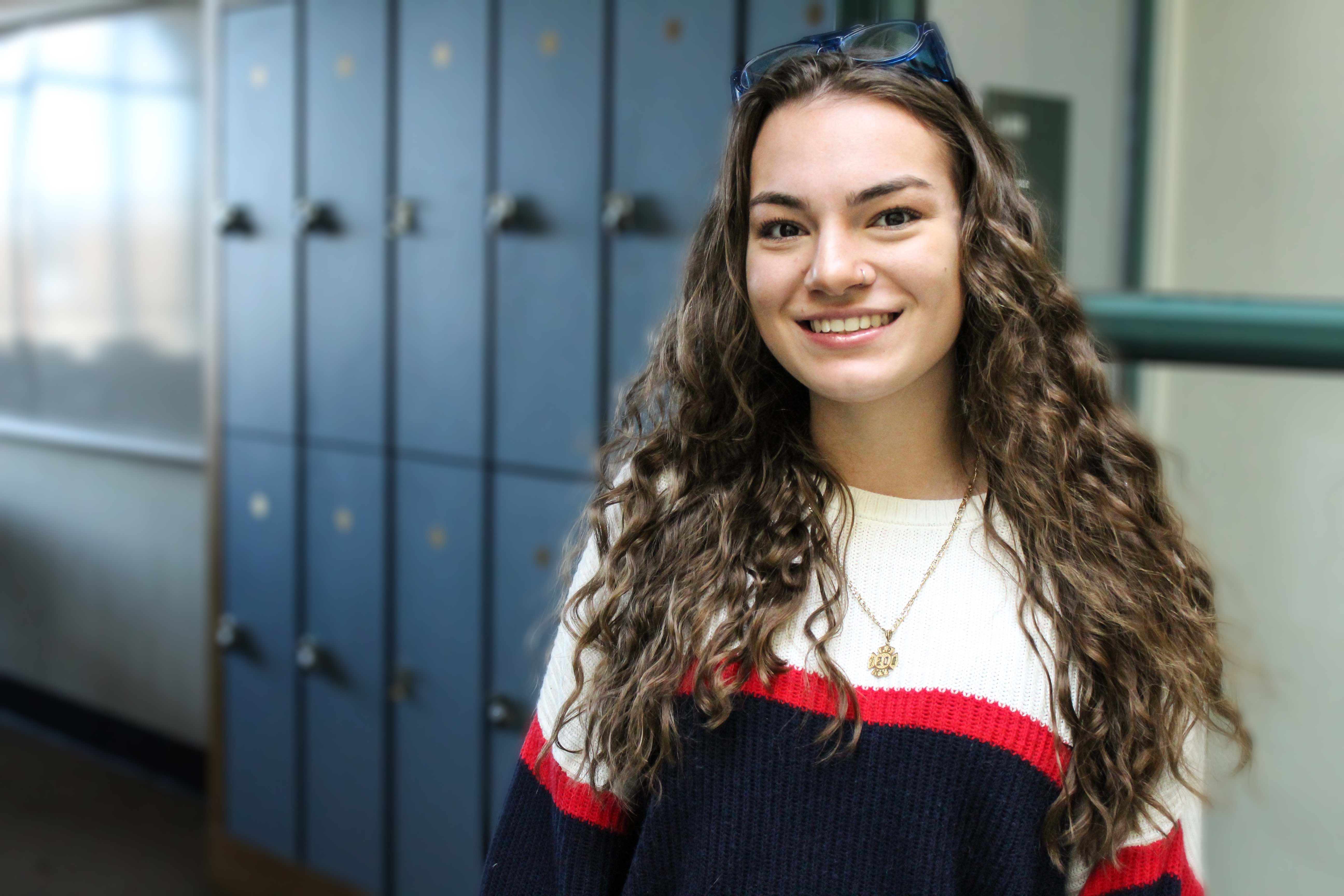Analyse Giordano is a junior majoring in allied health sciences at the University of Connecticut. She has her eyes set on going to med school, but there’s a lot she wants to get done first, including potentially groundbreaking research.
Giordano was recently named a University Scholar and received a SURF award for her project developing an improved model for continuous glucose monitors (CGMs) in the body.
Currently, physicians treating diabetes rely on spotty data taken from periodic glucose level checks. But a better way does exist: continuous glucose monitors that stay in a patient’s body, constantly checking blood glucose levels. Tracking dips and spikes in glucose levels allows physicians to identify patterns and leads to more effective, individualized treatments.
Unfortunately, current implantable monitors can only last for about a year in the body before the coating around them is encapsulated by macrophages from the immune system, negating the reliability of the data. As a result, patients using these monitors need to undergo a surgery every year to keep the monitor functional, which is an expensive and invasive approach.
Giordano’s project is developing a coating that has small nodes which prevent macrophages from being able to hold onto the monitor. This improvement could allow the device to function properly in the body for between five to seven years.
“This technology is more comfortable for patients and helps physicians develop treatment plans best-suited to each individual,” says Giordano.
Her drive to work in human health had an unexpected start at UConn: a chemistry lab. As part of her financial aid package, Giordano was given work study and when the opportunity to get paid to work in a lab came up, she jumped at the chance.
“I knew I wanted to go into STEM but I didn’t really know,” Giordano says. “I looked through the list of available research jobs, and chemistry was the one STEM field listed.”
Since her freshman year, Giordano has worked in the lab of Steven L. Suib, director of the Institute of Materials Science and Board of Trustees Distinguished Professor of Chemistry.
While Giordano’s interest has shifted since starting to work in Suib’s lab, she has been able to apply the research she is doing in chemistry to biomedical applications.
“Instead of switching out of the lab, I’ve been able to use it to my advantage,” Giordano says. “Especially since I’ve built that trust and connections with the people in this lab.”
The first project Giordano worked on in Suib’s lab was developing a mat that would change color based on the presence of sores, a tell-tale symptoms of diabetes. While Giordano was only working on a smaller part of this project, and later many others, these experiences were critical in leading her to developing her own research.
“Without doing those small projects first, I wouldn’t have been able to come up with this project on my own,” Giordano says. “I received a lot of guidance from the people I work with. I don’t know everything, but the people I work with pushed me and guided me to do this work.”
Suib says Giordano is making valuable contributions to both his lab and the field at large.
“Analyse Giordano is a bright, hard-working, clever person,” Suib says. “Her current project concerning the development of long-lasting devices to measure blood glucose levels is fascinating. Such devices would provide a practical solution to current problems with such devices.”
Giordano took inspiration for her career and current research from an experience leading an alternative spring break trip to the Dominican Republic. During her time abroad, she was able to work with other aspirational students who have made the most of their undergraduate careers. It was one of those students who encouraged Giordano to apply to the university scholar program.
“There were a lot of outside influences and inspirations that brought me to the project itself,” Giordano says.
Giordano says her undergraduate research career at UConn and this project in particular have allowed her to step into new fields, and being able to perform this research has changed her vision of her future.
“It’s really easy to get into that ‘pre-med tunnel-vision,’ like it’s the be-all-end-all and I have to devote my life to it,” Giordano says.
But Giordano has realized her path may be a winding one rather than a direct route to med school. She is considering getting her masters in health promotion sciences and wants to work for and perhaps even create her own non-profit organization too.
“Once I get to med school, my window will begin to close,” Giordano says. “Doing this research has made me realize how many things I want to do before that stage of my career. There are so many other people I want to help first.”



